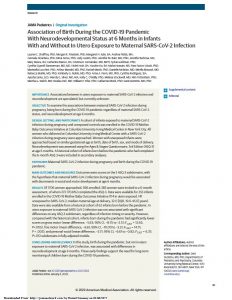
Objective
To examine the associations between maternal SARS-CoV-2 infection during pregnancy, being born during the COVID-19 pandemic regardless of maternal SARS-CoV-2 status, and neurodevelopment at age 6 months.
Design, Setting, and Participants
A cohort of infants exposed to maternal SARS-CoV-2 infection during pregnancy and unexposed controls was enrolled in the COVID-19 Mother Baby Outcomes Initiative at Columbia University Irving Medical Center in New York City. All women who delivered at Columbia University Irving Medical Center with a SARS-CoV-2 infection during pregnancy were approached. Women with unexposed infants were approached based on similar gestational age at birth, date of birth, sex, and mode of delivery. Neurodevelopment was assessed using the Ages & Stages Questionnaire, 3rd Edition (ASQ-3) at age 6 months. A historical cohort of infants born before the pandemic who had completed the 6-month ASQ-3 were included in secondary analyses.
Findings
In this cohort study of 255 infants born between March and December 2020, exposure to maternal SARS-CoV-2 infection was not associated with differences on any Ages & Stages Questionnaire, 3rd Edition, subdomain at age 6 months, regardless of infection timing or severity. However, both exposed and unexposed infants born during that period had significantly lower scores on gross motor, fine motor, and personal-social subdomains compared with a historical cohort of infants born before the onset of the COVID-19 pandemic.